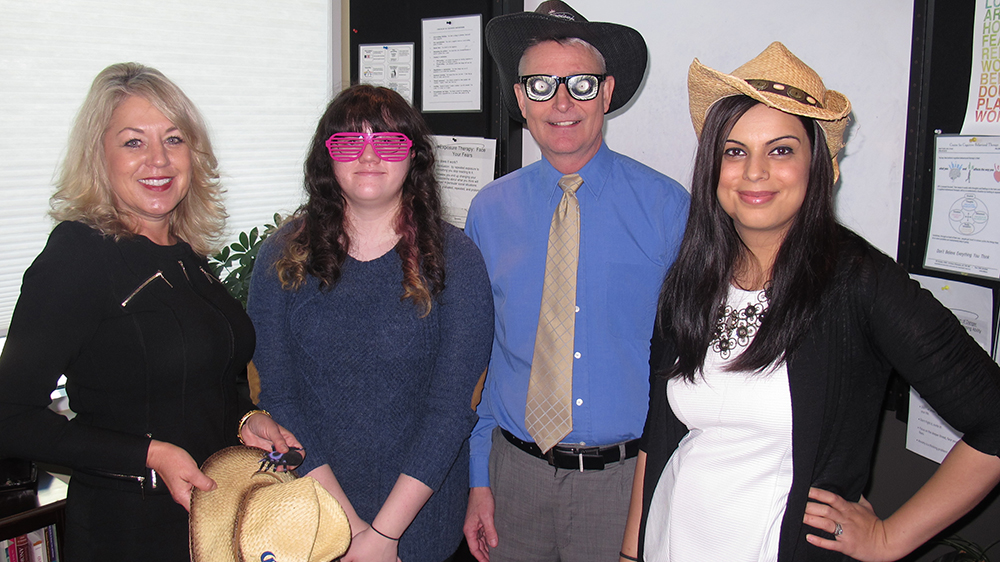
(L-R) Janet Caryk, Sara Von Gertzen and her therapist Wes Miller, and Joti Brar-Josan
Facing your fears can be a challenge, and it's one that a group of therapists are asking their patients to undertake.
Janet Caryk, registered psychologist and a clinical lecturer with the Faculty of Medicine & Dentistry, and Joti Brar-Josan, registered provisional psychologist, are two of the minds behind Fright Night, an exposure-based cognitive behavioural therapy program that challenges patients with anxiety and phobias to face their fears head on. Up to six people participate in each session, where they complete a specifically tailored exposure.
"If you come to Fright Night, you practice being afraid that night. You have to put something on the agenda and perform a therapist-assisted exposure," Caryk says.
"A lot of our patients are afraid of the exposure but, on the other hand, the motivation is there to be able to do these things," Brar-Josan explains of the process. "We usually target the exposure based on what's relevant to their lives. For a student who has social anxiety and performance anxiety, their exposures involve giving us presentations so that they can do that in the real world."
Before setting foot into Fright Night, the therapists and patients work together to establish a realistic goal. Someone with social anxiety, for example, may be asked to buy a coffee while sporting an exuberant hat or funky sunglasses. During the exposure, patients are asked to rate their fear on a scale of one to 100 and are asked to vocalize their fear-based thoughts. "There's never pressure," Caryk says. "But there's lots of encouragement. We want you to move along because this phobia is interfering with your life, but we aren't going to force you."
Sarah Von Gertzen is intimately familiar with the process, having attended two previous sessions. The 20-year-old has social anxiety, a condition characterized by fear of being scrutinized and judged negatively by people in social situations. "I have the same thought process whether I'm talking to somebody, having to pay with cash or anything that is really stress-inducing to me," she says, adding that it's the "what ifs" of a situation that trigger her anxiety. "If I can't manage the thoughts, then that's when I get physical symptoms."
During her first experience at Fright Night, Von Gertzen was challenged to pay for a coffee at the neighbouring Starbucks using only change. Overwhelmed, she opted to watch the other patrons while her therapist, Wes Miller, completed the task. "Dr. Miller went up and he dropped all of the change. It was my worst fears combined," she says, specifically referencing the fear of attracting scorn from other customers or irritation from the employees. "It was a good experience because when he dropped the change on the ground or when he was looking at the coffee menu and didn't know what to get, no one cared. Everyone was in their own world."
Caryk notes that while confronting their fears is an important part of the evening, there is another huge benefit: the group support is infallible. It offers patients the kinship of knowing that they are not the only person with a phobic avoidance disorder and offers the unwavering support of people with a similar mindset. While the phobias may vary, their experiences are similar; the group encourages each other to push through their fears on the pathway to better mental health. "The thing about Fright Night is that it's supportive. You tell your secret and find out that, as we always say, 'other lovely, smart, competent people' have phobias. You're not alone," Caryk says.
"With mental health, sometimes it's hard to see it. You don't have a broken arm. You don't have a broken leg. You can't see what the struggle is for someone who's on the bus," Von Gertzen says of her Fright Night experiences, specifically citing her own trigger of public transit. "There are people in business suits and then there are people like me, a student. [Mental health] affects everybody blindly."
With a few Fright Nights behind them, Caryk and Brar-Josan are thrilled looking toward the future. So much, in fact, they intend to expand their outreach with Stage Fright, a program that offers post-secondary students the opportunity to practice presenting in preparation for assignments.